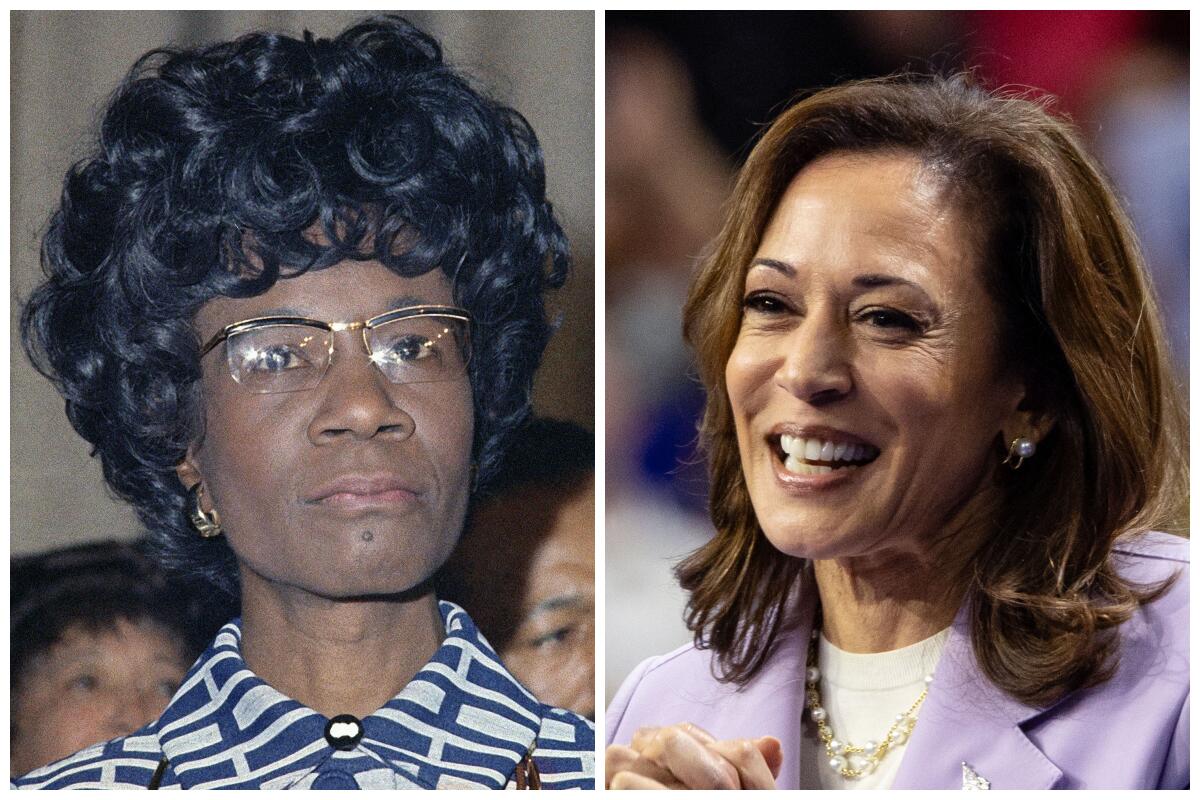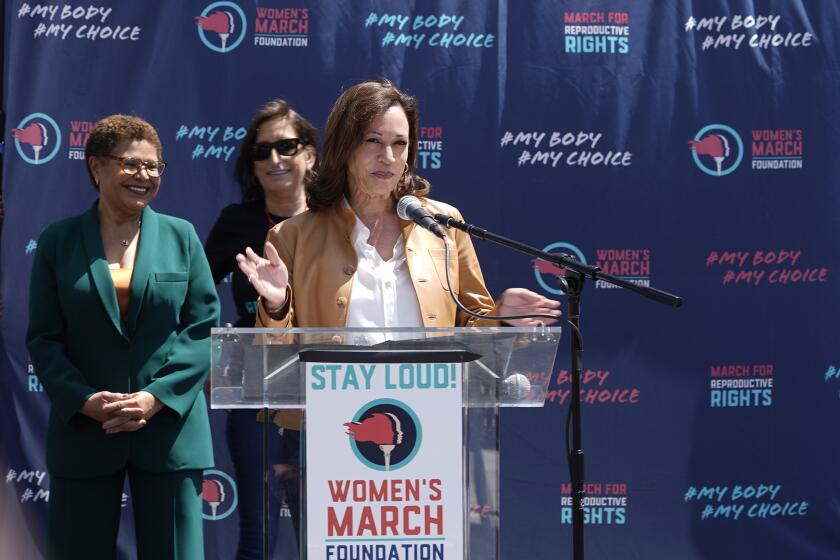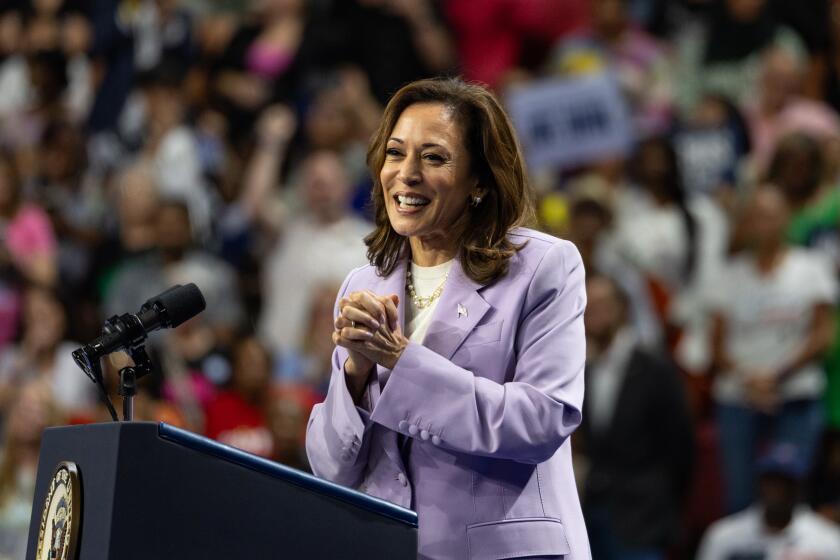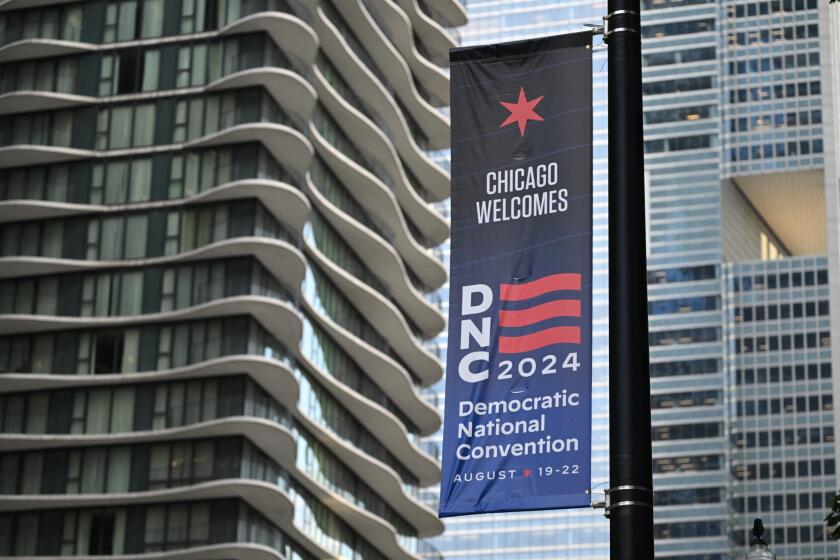How Shirley Chisholm’s run for president made Kamala Harris’ campaign possible

- Share via
When Kamala Harris takes the stage on Thursday night, becoming the first woman of color to accept the Democratic Party nomination for president, she will be charting new territory — something she has done in every elected position she has held since winning the race for San Francisco district attorney in 2003.
While Barack Obama and Hillary Clinton precede the vice president in this ceiling-breaking pantheon, neither experienced the double jeopardy of being Black and female. In those, and in many other ways, Harris has more in common with Shirley Chisholm.
Chisholm was the first Black woman member of Congress. She was elected in 1968 and she had the fearlessness and audacity to run for president just four years later, joining the white male candidates in the crowded 1972 Democratic primary. Her Black male colleagues in Congress and the civil rights movement were furious because they thought the honor of becoming the first Black presidential candidate should go to a man. Even the National Women’s Political Caucus, which Chisholm co-founded, did not endorse her because its leaders were trying to build political clout for women’s issues, and they knew Chisholm couldn’t win.
Throughout an impressive career, Kamala Harris has not only done every job well, she has also done it while under a microscope.
The Chisholm campaign slogan, “Unbought and Unbossed,” perfectly described her outsider candidacy. She barnstormed the country speaking to large crowds of young, multiracial voters who embraced her message of gender and racial equity, abortion rights, alleviating poverty and ending the Vietnam War. With a campaign run on a shoestring budget by hundreds of young volunteers, Chisholm saw it as her mission to engage alienated youth (the voting age had just dropped from 21 to 18) in the political system.
When she met Barbara Lee, then a single mother on welfare and Mills College’s president of the Black Student Union, Chisholm tried to compel her to register to vote. “I said, ‘Not me. That’s bourgeoise. I’m a revolutionary, so I’m not going to…’” recalls Lee. But Chisholm was persuasive and Lee joined her campaign, starting the political life that led to her becoming a now 13-term congresswoman from Oakland.
The parallels between today’s political environment and the upheaval in the 1960s and 1970s that Chisholm encountered are striking. These include a new civil rights movement (Black Lives Matter) and a new women’s rights movement (#MeToo), as well as widespread student protests over a foreign war, this time not in Vietnam but in Israel and Gaza.
Kamala Harris was already a historic figure, having been the first female vice president. She does it again this week, accepting the nomination as the first major party candidate who is a Black and South Asian woman.
Of course, the most arresting part of the past roaring back into the present is the 2022 Supreme Court decision wiping out 50 years of federal abortion rights. The urgency women now feel about regaining their lost freedom echoes the grassroots uprising of the women’s liberation movement in the late 1960s and early 1970s.
And just as Chisholm worked to engage young people, Harris is energizing a TikTok generation that notoriously distrusts political institutions. Gen Z had been as apathetic about voting for either Donald Trump or Joe Biden as Barbara Lee’s generation had been about voting for Richard Nixon or George McGovern.
In 1969, when the 535 members of Congress included only 10 Black and 11 female members, Chisholm was treated with a disdain that verged on disgust by many of her colleagues on Capitol Hill. Her campaign signs were defaced with racial slurs, and Nixon’s dirty tricksters tried to smear her reputation in a secret campaign that they brazenly code-named “Operation COAL.”
Democrats should party while they can in Chicago. For the next 10 weeks, Kamala Harris and Tim Walz will face trench warfare with a gutter-dwelling Donald Trump.
Again, the past roars into the present as Trump’s campaign brings racist strategy to life. His campaign’s racist attacks on Harris started with mispronouncing her first name and then accusing her of deciding only recently to “turn Black.” The three Supreme Court justices appointed by Trump who were part of the majority that overturned Roe vs. Wade, along with JD Vance’s general denigration of women (especially women who don’t bear children), appears to be the tip of the iceberg of anti-woman elements in the Republican ticket’s Christian nationalist-inspired strategy.
But along with this open misogyny and racism, the Trump-Vance ticket is also playing a macho card (complete with Hulk Hogan and Kid Rock) and as a result, this election is already predicted to have the largest gender gap in presidential election history.
Back in 1972, the National Women’s Political Caucus, led by Congresswoman Bella Abzug and Ms. magazine founder Gloria Steinem, endorsed McGovern over Chisholm because Chisholm had no pathway to winning the nomination and McGovern agreed to place abortion rights on the party platform. But in the end, McGovern reversed course and would not back the hot-button position. Chisholm, who had asked the women delegates to vote their conscience and endorse her, felt vindicated.
Feminist and civil rights advocate Florynce Kennedy attributed McGovern’s betrayal to the women’s caucus giving up their endorsement too easily, without securing an airtight deal. As she said colorfully, “Honey, if you’ll f— for a dime, you can’t complain because somebody else is getting a fur coat.”
Chisholm earned just 2.7% of the popular vote and 152 delegates at the Democratic convention in Miami Beach. Her candidacy may not have been politically practical, but it proved a colossal success in exposing the entrenched culture of racism and sexism in American politics.
Chisholm recalled the glory of her time at the DNC, later writing: “When I got to the convention hall, it was lit up by noise. That was a wonderful moment for me, to see the way all of the delegates received me at the convention. … Because I had felt that someday, a Black person or a female person should run for the presidency of the United States, and now I was a catalyst for change.”
Kamala Harris has the winds of this history at her back. The groundwork laid by Shirley Chisholm and her generation of second-wave feminists might just be solid enough for this country to elect a woman of color for president.
Clara Bingham is a former Newsweek White House correspondent. Her latest book is “The Movement: How Women’s Liberation Transformed America 1963-1973.”
More to Read
A cure for the common opinion
Get thought-provoking perspectives with our weekly newsletter.
You may occasionally receive promotional content from the Los Angeles Times.









